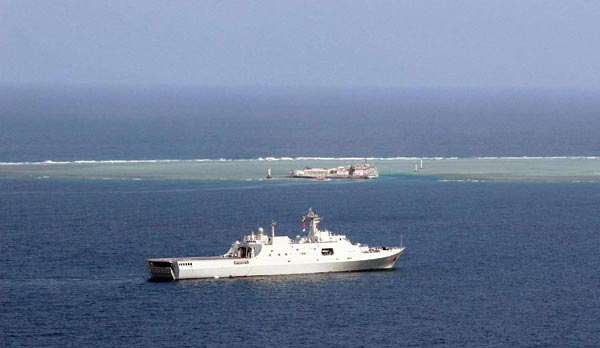
A formation of the Nanhai Fleet of China's Navy finished a three-day patrol of the Nansha islands in the South China Sea in early May. (Photo/Xinhua)
In its annual report to the United States Congress last week, the Department of Defense said China is using non-military "coercion" to gain control of strategic waters in the Asia-Pacific region. The Pentagon report on China's military and security developments said, "China continues to exercise low-intensity coercion to advance its claims in the East and South China seas", adding that Beijing's tactics involve the use of "timed progression of incremental but intensifying steps to attempt to increase effective control over disputed areas and avoid escalation" of military conflicts.
The report also expressed concerns over China building military bases overseas.
Responding to Pentagon's irresponsible remarks, China's Ministry of National Defense said China will firmly safeguard its national sovereignty in the South China Sea while maintaining regional peace and stability. In fact, the frequent U.S. military deployments and reconnaissance by U.S. aircraft and warships over Chinese territory are responsible for raising tensions in the Asia-Pacific, the ministry said.
Since such an exchange of rhetoric reflects the differences between China and the U.S. on the South China Sea issue, there is need to analyze the nature of frequent U.S. patrols near China's Nansha Islands in the name of freedom of navigation.
The U.S. insists that it will not take sides in the South China Sea disputes between China and some Southeast Asian countries, especially in the sovereignty dispute over the Nansha Islands. But the U.S. also claims that the islets and reefs of the Nansha Islands are actually low-tide elevations that have never had sovereign territorial waters or jurisdiction over wider waters, including exclusive economic zones and continental shelves.
Based on such arguments, the U.S. claims that according to "freedom of navigation" its ships can patrol the waters within 12 nautical miles off those islets and reefs.
China insists that the unapproved U.S. patrols in the name of freedom of navigation off the Nansha Islands compromise its sovereignty over the waters. Such patrols, China says, are not freedom of navigation and thus should be subject to Chinese laws on innocent passage of foreign vessels and seek prior approval from the Chinese government.
Way back in May 15, 1996, China published the baseline of the territorial seas for the Xisha Islands. But due to various reasons, it has so far failed to draw a similar baseline for the Nansha Islands, leaving space for disputes with other littoral countries. However, a Chinese government statement on the country's territorial sea on Sept 4, 1958, and the Law of the People's Republic of China on the Territorial Sea and the Contiguous Zone on Feb 25, 1992, declared China's rights on the waters 12 nautical miles off the Nansha Islands based on a straight baseline, and stipulated that foreign warships have to seek prior permission from China before venturing into those waters.
According to the law, the patrols by U.S. warships within the 12 nautical miles off the Nansha Islands without China's prior permission do not fulfill the requirements of freedom of navigation. Instead, they can be considered innocent passage in China's territorial waters, which are subjected to China's maritime laws and regulations.
There is little doubt that the so-called freedom of navigation activities of the U.S. warships within 12 nautical miles off the Nansha Islands without China's prior permission cause security concerns for China and could lead to unpredictable accidents, which would go against the spirit of the memorandums of understanding between the militaries of China and the U.S. on mutual notification on major military events and possible air or sea encounters. They could also compromise Sino-U.S. relations and undermine the efforts of China and the Association of Southeast Asia Nations member states to ease the tensions emanating from the South China Sea disputes.
If U.S. warships continue to patrol the waters off the Nansha Islands under the garb of "freedom of navigation", China will have to firmly safeguard its sovereignty and security, including fortifying its territorial waters in the South China Sea.
The author Jin Yongming is director of China Ocean Strategy Studies Center at the Shanghai Academy of Social Sciences.


















































